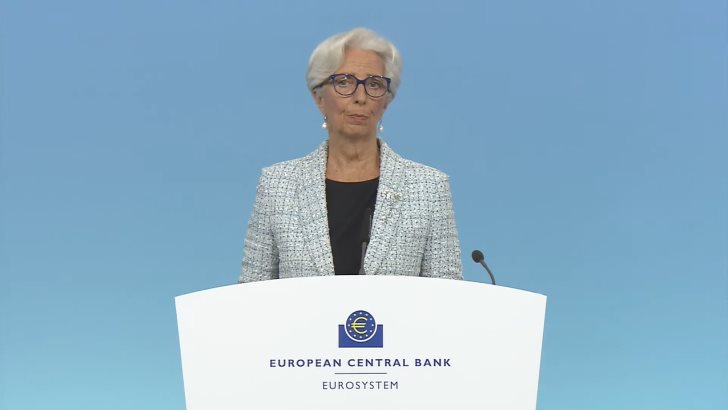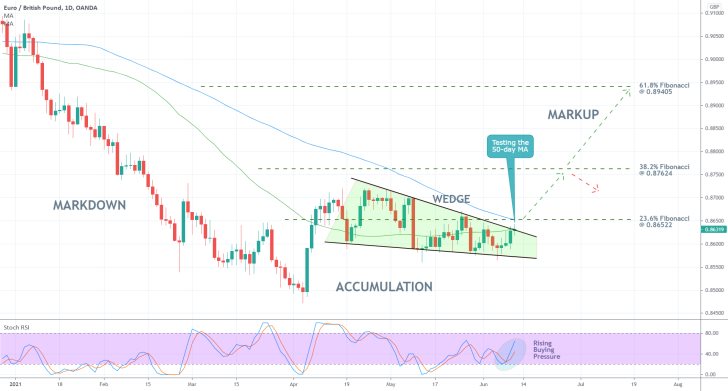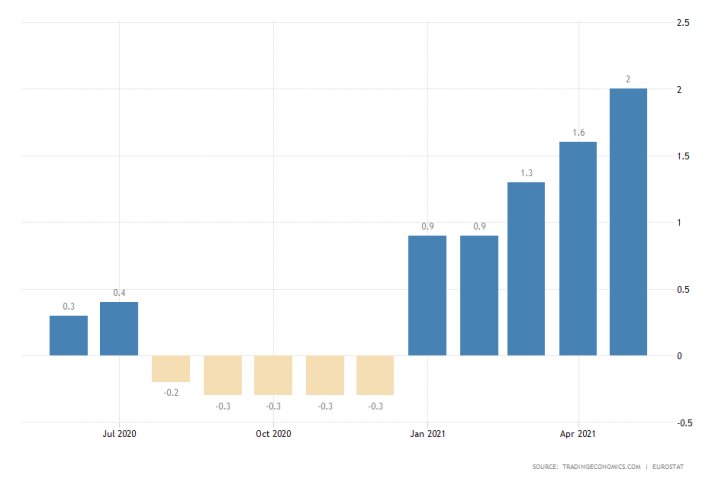
Market perceptions are currently being motivated by traders and investors' outlook on inflation in Europe and the U.S. To understand how this is affecting the Euro and the greenback, check out our last comprehensive analysis of the EURUSD pair!
The Governing Council of the European Central Bank expectedly decided to maintain the near-negative Main Refinancing Rate unchanged at 0.000 per cent. The Pandemic Emergency Purchasing Programme (PEPP) is also left with the same envelope of 1850 billion euros.

The EURGBP pair continues to prepare for an eventual breakout above the 23.6 per cent Fibonacci retracement level at 0.86522, which would signal the likely beginning of a new massive Markup. Markups are an essential component of the Wyckoff Cycle Theory.
Notice that the current consolidation is taking the shape of a Descending Wedge, which typically serves as an interim component before the price resumes climbing. In other words, the emergence of such a Wedge below the 23.6 per cent Fibonacci is inlined with the primary expectations for a breakout.
The Stochastic RSI indicator is underpinning rising buying pressure as well, which could catalyse a decisive breakout above 0.86522. Before it could take place, however, the price would also have to break out above the 50-day MA (in green) and the 100-day MA (in blue).
The two moving averages serve as floating resistances at present. Yet, a decisive breakout above them, coinciding with a breakout above the 23.6 per cent Fibonacci and the Wedge's upper boundary, would represent a convincing indication of the beginning of a new Markup.
Inflation Still Below ECB's Projections
The Council decided to "confirm its very accommodative monetary policy stance" because financial conditions in the Euro Area continue to be affected by the pandemic.
The recovery process continues to be bumpy and uneven, which is causing investors' sentiment to be easily jolted. Financial stability in the Eurozone is thus still dependent on ECB's massive liquidity support.
The primary reason why the Council refrained from slowing down the pace of its emergency asset purchases is that inflation continues to be below the Bank's longer-term projections.

Headline inflation in the Eurozone is currently at 2.0 per cent, though Christine Lagarde and her colleagues expect consumer prices to fall in Q3 as energy demand eases.
Trendsharks Premium
Gold is undergoing a correction, as investors take profits to offset losses from falling stock prices, impacting their margins. However, we anticipate a renewed wave of [...]
The Swiss stock market index is mirroring its global counterparts, such as Germany 40 and US100, experiencing a sharp decline following the announcement of new [...]
We’re analyzing the weekly chart to grasp the broader market trend. Over the past three years, the US30 index has surged by 17,000 points, often resembling a nearly straight [...]
Over the past week, the DAX has experienced a sharp decline, plunging by an astonishing 3,400 points. This downward movement is not isolated, as its international counterparts, such as the UK100 and US100, are also facing significant [...]
EURUSD recently formed a double top at 1.0930, signaling a potential trend reversal, and has since begun a correction. After a 600-pip rally since early March, a pullback at this stage is both expected and healthy. Given these conditions, we are placing a [...]
Since early March, EURJPY has surged nearly 1,000 pips, providing us with several excellent trading opportunities. However, as the rally matures, many early buyers are beginning to take profits, leading to a noticeable slowdown in the uptrend. On Friday, the pair formed a [...]
The AUDJPY currency pair continues to be dominated by bullish momentum, as multiple golden cross patterns reaffirm the strength of the ongoing uptrend. Despite this, we are witnessing a much-needed [...]
The EURAUD currency pair appears to be undergoing a trend reversal, signaling a potential shift in market direction. A notable technical development is the formation of a Death Cross on the chart, a widely recognized bearish indicator that typically suggests a [...]
After securing an impressive 200-pip profit last week, the EURJPY currency pair is now undergoing a southward correction, retracing some of its recent gains. Despite this temporary pullback, the Golden Cross remains intact, reinforcing our view that the overall trend continues to be [...]
The appearance of a Golden Cross in Silver strengthens our analysis that the metal is currently in a strong uptrend, indicating further bullish momentum in the market. This technical pattern, where the short-term moving average crosses above the [...]
This trade presents a considerable level of risk and can be classified as an opportunistic move based on recent price action. The GBPUSD currency pair has experienced a substantial bullish rally, surging by nearly 500 pips in a strong upward movement. However, after this extended period of appreciation, the pair is showing signs of a potential [...]
The anticipated Death Cross on the SMI20 appears to be failing as price finds strong support at the 23% Fibonacci retracement level. After testing this area, the index has shown bullish strength, printing several large green candles, signaling an increase in [...]
A Golden Cross has just appeared on the USDJPY chart, signaling a potential bullish move. This technical pattern occurs when the 20 period moving average crosses above the 60 period moving average, a widely recognized indication of increasing [...]
After 2 months of a down trend, we finally see some indications of price recovery for Oil. The golden cross, a historic buy signal, supports this [...]
For the past month, the German DAX40 has experienced a remarkable 10% surge, reflecting strong bullish momentum. Despite ongoing market volatility and frequent pullbacks, every dip continues to attract fresh buyers, reinforcing the [...]
Oil continues its downward trajectory, despite occasional pullbacks. The overall trend remains bearish, reinforced by multiple Death Cross patterns, a classic sell signal indicating further weakness. Adding to this bearish outlook, the critical [...]
Over the past few days, gold has experienced a sharp decline of more than $100. This downturn can be attributed in part to traders securing profits to manage their margins, which are under strain due to the significant drop in major indices. Currently, gold has fallen below the [...]
The NASDAQ 100 index is showing strong bullish momentum, as evidenced by the formation of a Golden Cross on the chart. This classic buy signal occurs when the short moving average crosses above the long term moving average, suggesting that upward momentum is [...]
The EURAUD currency pair has encountered a significant resistance level, failing to break above the critical 61% Fibonacci retracement level. This suggests that bullish momentum is weakening, reinforcing the case for a potential downward move. Given this technical setup, we favor entering a [...]
The UK100 is experiencing a remarkable rally! Over the past few weeks, the British stock market index has surged nearly 800 points. Each minor dip has attracted more buyers, fueling the bullish momentum. However, since last week, we’ve observed a slight [...]




















